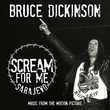GhostofCain
Ancient Mariner
I maybe be confusing things I've read in the past but I think Tears of the Dragon was based on a track originally written for Somewhere in Time called Pendragon's Tears.
That is correct.
I maybe be confusing things I've read in the past but I think Tears of the Dragon was based on a track originally written for Somewhere in Time called Pendragon's Tears.
No disrespect @Kalata, but the search tool is pretty useful. This is what I posted some time ago on the matter:
Bruce Dickinson
Wait a minute... does this mean that the TM b-side is the "winds of change, roll over us" quiet one and the BTP b-side is the "WIIIIIIIINDS OF CHAAAANGE ROLL OOOOOVER UUUUSSSSS" loud one? I just assumed the live version from Dive! Dive! Live! was just done... for the concert. I never realized...forum.maidenfans.com
And here you have some interviews with Keith Olsen and Shay Baby for your reading pleasure:
 I will check it.
I will check it.I maybe be confusing things I've read in the past but I think Tears of the Dragon was based on a track originally written for Somewhere in Time called Pendragon's Tears.


Hiss, hiss, pop, pop, hiss. We older folk moved on from vinyl for a reason. It’s flat-out bizarre to witness the modern obsession with it...You really can’t go wrong there. The vinyls all sound killer.
Well, that’s a true statement if you value ultra-high frequencies that normal human beings can’t hear, and you’re willing to put up with all the other artifacts dragging a physical needle across a bumpy surface creates. But if you prefer cleaner reproduction of human-hearable frequencies, then it’s the other way around, at least when you’re talking uncompressed digital. And if you have superhuman hearing, there are often higher bit rate and bit depth versions of uncompressed digital recordings available.Just wait till I bring up how the vinyl format is objectively better than any other format, including digital, which is sloppy. Won’t that be fun.

I collect vinyl, not really listen to it. But if you have a decent record player, vinyl's in good/new condition and a needle in good shape, hiss/pop will be minimal. I've had several where I heard nary a hiss/pop. That said, keeping vinyls in good enough shape to play continously and not here crackling is next to impossible. But I like collecting vinyl for the sake of collecting. Iron Maiden especially has great album art and I want the biggest version of it I can get. Then I just download 320kbps MP3s to do my actual listening.Hiss, hiss, pop, pop, hiss. We older folk moved on from vinyl for a reason. It’s flat-out bizarre to witness the modern obsession with it...
No, compressed audio has noticeable artifacts in it, though higher bit rate encoding helps. On the other hand, uncompressed digital (CD, FLAC, etc.) won’t have any artifacts other than the digitization itself, and as long as you can’t hear frequencies above 24KHz or so, its frequency reproduction is going to sound identical to the source recording.I am not too knowledgeable of the sonic arts but would I be right in sayin that a remaster on Spotify through good speakers is just as good as a modern vinyl remaster?
Over Spotify? Probably. Over uncompressed digital if you’re a normal human being? No way.So vinyl for the win?
I'll be real honest, MOST folks could listen to a 256kbps MP3 of their favorite band and have it switched back and forth between a superior format, whether CD, FLAC, or Vinyl, and not be able to tell the difference. You need to know what the difference is supposed to be and then listen for it. Or a remaster needs to be outlandishly different to sound noticeably different. I collect vinyl not because it may be the superior or most "true" sound format, but because it's big, pretty, and I like to collect. When I play a shiny new vinyl on a shiny new record player and high quality needle, I tell myself I'm listening to the superior version of the audio, and perhaps I am. But I believe that should a sound-ninja sneak in and replace my shit with a fairly compressed MP3, I'd likely only notice the breeze as he left he window open.So what is uncompressed digital then? Is that a true reproduction of the original recording? This is why remasters puzzle/annoy/confuse me. So if I listen to an original copy of an early Maiden album on vinyl, am I getting an inferior sound? Does the remaster properly reflect what the band sounded like at that moment in time or is a remaster what the band feel how it should be 30yrs after the fact? I know they aren't adding anything so, to me, a remaster is probably closer to what went on in the studio at the time, which is what I want to hear.
I have a first pressing of Maidens debut on cd, cassette and vinyl, I suppose this would be a good comparison. Although they would be played through different systems. What is a boy to do?
The key piece of science here is that if the sampling rate is greater than 2x the highest frequency you’re able to physically hear, it will be literally impossible to hear the difference between the digitized and analog versions. Thus CDs and uncompressed digital audio being indistinguishable from the source to human ears.Notice that while the shape of the waveform is intact, it now has a sort of grid super imposed on it, and that grid now marks the sound on the CD. The lower the bitrate, the larger the "grid" and this in turn means shittier quality. The higher the bitrate, the smaller the grid, and while it'll never be "perfect" if it's digital, it'll also likely never sound different to the human ear.
The key piece of science here is that if the sampling rate is greater than 2x the highest frequency you’re able to physically hear, it will be literally impossible to hear the difference between the digitized and analog versions.
it will be literally impossible to hear the difference between the digitized and analog versions.
